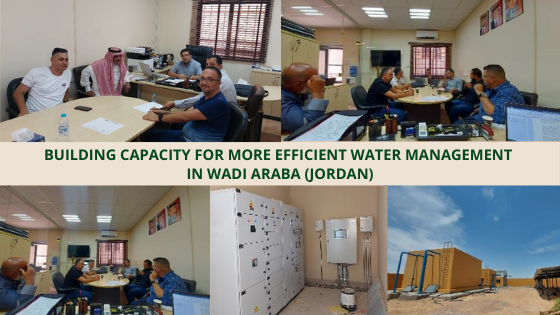MEDISS building capacity efforts for more efficient water management in Wadi Araba (Jordan)

As highlithed by the United Nations, “Capacity-building is defined as the process of developing and strengthening the skills, instincts, abilities, processes and resources that organizations and communities need to survive, adapt, and thrive in a fast-changing world. An essential ingredient in capacity-building is transformation that is generated and sustained over time from within; transformation of this kind goes beyond performing tasks to changing mindsets and attitudes.”
The United Nations is committed to transformation from within Sustainable Development Goal 17: Revitalizing the Global Partnership for Sustainable Development. It includes targets for capacity-building, including increasing technology and innovation ... and improving data collection and monitoring for the achievement of the SDGs themselves. Universities in particular can serve as centers of capacity-building through research, innovation and data collection and analysis.
In the context of the MEDISS project, Italian partner 'CRENoS', scientific coordinator for awareness and capacity-building initiatives, has directed the action on a strategic line that includes not only all those activities related to the development of the human resources involved, but also to the creation of an empowering environment that can activate virtuous pathways that foster the sustainability of development.
For this reason, in the pilot areas, the partners are implementing specific initiatives aimed at the targets identified in these three years of work, to transfer knowledge of how to use water efficiently and inform about the programme's innovative solutions. Today we present the work carried out by the Jordanian MEDISS partners Aqaba Water Company.
Aqaba Water Company organized and facilitated the local capacity building workshop activities in Aqaba, Jordan. The first one was conducted on Sunday, July 3, 2022, and involved Qaa Al-Saeedin Agricultural Association to discuss how treated water is used for agricultural purposes and evaluate water reuse options to improve its quality to create new drinking water.
The Qaa Al-Saeedin Agricultural Association is one of the main stakeholders in the Jordanian project; it represents farmers and inhabitants of the village of Al Risha and the Wadi Araba area and has a deep interest in the optimal utilisation of available water resources for new and diversified agricultural techniques.
The second workshop activity, conducted on Thursday, July 14, 2022, involved Gama Engineering Contracting Est.- a leading contracting company in the Middle East region - since implemented the station and will operate it for two months after its completion until the takeover. The workshop activities presented MEDISS opportunities in Al Risha desalination plant, the progress made and the advanced stage of the analysis activities.
Conclusion
The Awareness and Networking output activities in this capacity-building workshop gave the President of Qaa Al-Saeedin Agricultural Association and Gama Engineering Contracting Est. an understanding of the main water challenges in Jordan, MEDISS project information and output, and how the project is crucial to the agricultural sector in Wadi Araba – Jordan and how to use water efficiently.
Workshops Agenda
• Opening and welcoming remarks and overview of the project by the MEDISS Project Communication Expert and MEDISS Partner Coordinator, Mr. Nizar Akkawi:
- Program and funder.
- Management and partners.
- Project duration.
- Objectives.
- Outcomes and outputs.
• Aqaba water company projects manager, Mr. Anas Al Khatib, and MEDISS Lab Technician for Water Analysis, Mr. Ahmad Al Hanaqtah, explained and discussed the project outputs. During the respective activities, Aqaba water company, Qaa Al-Saeedin Association and Gama Engineering Contracting Est. agreed on using Al Risha desalination plant brackish water and collecting it in an industrial pond in order to use it later for agricultural purposes.









